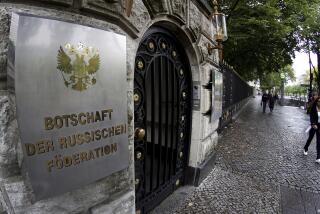British Consider Expelling More Soviet Envoys
- Share via
LONDON — Amid growing concern about a major rupture in Anglo-Soviet relations, British leaders on Sunday held urgent discussions on the possibility of expelling additional Soviet diplomats in the wake of the Kremlin’s tough response to London’s expulsion of 25 alleged Soviet spies.
Prime Minister Margaret Thatcher reportedly conferred with Foreign Secretary Geoffrey Howe several times by telephone in the course of what Howe called “urgent and careful” consultations on a response to Moscow’s decision Saturday to expel 25 British diplomats, businessmen and journalists from the Soviet Union.
The Foreign Office denied reports that a so-called “second list” of Soviet diplomats and others to be expelled had already been drawn up.
Decision Expected Today
Britain’s reaction was expected before Thatcher’s scheduled departure today on a trip to Egypt and Jordan.
Britain on Thursday ordered the Soviet residents to leave the country, apparently after they were named as spies by Oleg A. Gordievski, the head of the KGB apparatus at the Soviet Embassy in London who defected several weeks ago.
The expulsions will now leave 32 British diplomats in Moscow and 33 Soviet diplomats in London. More than 200 Soviet citizens work in Britain in non-diplomatic jobs. About 100 Britons work in the Soviet Union.
The Soviets have retaliated in the past against Western countries that have expelled their diplomats. But the level of Saturday’s retaliation is unprecedented in both its speed and its intensity.
It has clearly stunned the Thatcher government and those dealing with the affair in the British Foreign Office.
When 105 Soviets were thrown out of Britain after a major spy scandal broke in 1971, Moscow retaliated by ordering only five expulsions and refusing to allow 13 other Britons who were away on vacation to returning to the Soviet Union.
In addition to the possibility of expelling additional Soviet residents, the Foreign Office is also considering the option of reducing the number of Soviet diplomats permitted in Britain. That number was increased from 39 to 46 on the same day that the expulsions were announced, apparently in an attempt to soften the impact of the expulsions on bilateral Anglo-Soviet ties.
In the months before Gordievski’s defection, relations between the two countries had undergone a gradual improvement, spurred by the successful meetings between Thatcher and Mikhail S. Gorbachev last December, three months before he assumed power in the Kremlin.
Political analysts interpret the intensity of the Soviet reaction as a deliberate signal of toughness on the part of the new Kremlin leadership, both to Britain and other Western countries.
Thatcher has long demonstrated her own toughness, and a sharp British counterretaliation would be in keeping with her political style.
Impact on Summit
However, another round of expulsions would have a far more serious impact on relations between the two countries and could spill over into the larger Soviet relationship with the West in advance of Gorbachev’s scheduled November summit with President Reagan in Geneva, developments Thatcher would be anxious to avoid.
More to Read
Sign up for Essential California
The most important California stories and recommendations in your inbox every morning.
You may occasionally receive promotional content from the Los Angeles Times.













